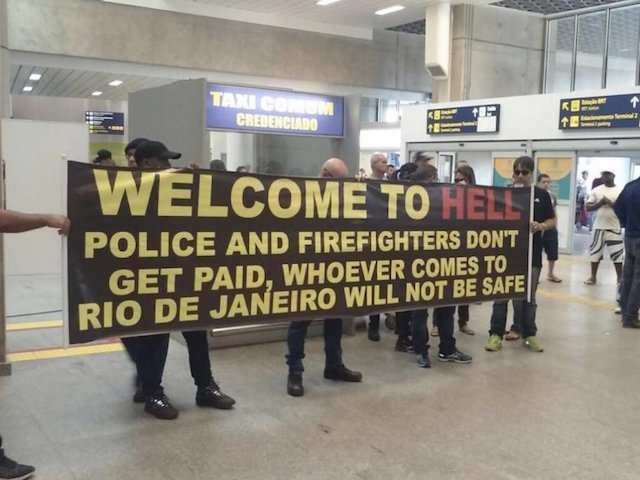Brazil is struggling to ensure Rio de Janeiro, arguably the country’s most chaotic city, is prepared to host the 2016 Summer Olympic Games scheduled to start on August 5.
Rio is facing an array of hurdles as the reality of hosting one of the most revered and heavily attended sporting competitions sets in. It may be too much to handle for Brazil, which finds itself in the midst of a crippling recession.
1. Police Don’t Have Enough Money to Buy Toilet Paper
Up to an estimated 500,000 people are expected to travel to Brazil for the Summer Olympics. Brazil’s national intelligence agency has already warned of the risk of radical Islamic terrorism at the games, noting that there has been a rise in the number of Brazilians sympathizing with jihadist groups like the Islamic State (ISIS/ISIL).
ISIS has threatened to attack Rio during the games. There is also the street crimes and violence that afflicts the city on a daily basis. Yet, an ongoing recession and budget shortfalls mean security forces and local police lack funding. Rio’s acting governor Francisco Dornelles recently revealed that he is still awaiting a nearly $900 million payout from the federal government to pay for police and workers on Olympic venues. He declared:
How will people get to places without underground transportation? How will people feel protected in the city without security? We have to give proof that we are equipping security and the ready mobility for people to come to the country.
In a decree demanding the federal emergency funds, Dornelles warned the lack of money to pay for public services “can even cause a total breakdown in public security, health, education, mobility and environmental management.”
“Police helicopters are grounded, patrol cars parked. The city’s security forces are so cash-strapped they’re reportedly begging for donations of pens, cleaning supplies and toilet paper,” reports International Business Times.
2. The Ministers Responsible for Hosting the Event Keep Resigning
Weeks before the Olympics, Brazil’s Minister of Tourism, Henrique Alves resigned along with other high-ranking officials in what has become an exodus of allies of the embattled leftist President Dilma Rousseff who is facing impeachment.
Sports Minister George Hilton and Col Adilson Moreira, who led the National Force for Public Security responsible for guarding venues during the Olympic Games, have also renounced their senior positions.
3. The Water Athletes Are Supposed to Compete in is Hopelessly Polluted
Some of the bodies of water that are to be used in Olympic events are extremely polluted, prompting serious concerns. This year’s sailing competition is scheduled to be held at the Guanabara Bay, nicknamed Rio’s “latrine.”
The Daily Mail reports:
Sailors in test events have already collided with floating debris and many others falling ill with vomiting and rashes as Rio faces calls to clean up the bay, and protect athletes from potentially dangerous hazards.
But it’s not just household rubbish: human waste, blood-filled syringes, and even dead bodies have been discovered amongst the floating mass.
The ocean waters and rivers around Rio have been deemed hazardous to the health of athletes.
“Excuse my frankness, but the rivers feeding into the lagoons are pure sh–,” said area biologist Mario Moscatelli, according to a recent report by Public Radio International. The scientist added, “The feces of thousands of people emptied into the river without treatment” is everywhere.
4. The Subway Line Connecting Tourists to Olympic Venues Isn’t Ready Yet
The Olympics are only five weeks away, yet building debris can be seen all over Rio. Moreover, the construction of a new subway extension remains unfinished and the stench of sewage fills the air. Several key venues for the 2016 games are still not fully constructed.
According to the Daily Mail:
The games are engulfed in a desperate last-minute building and repair operation…despite being given seven years to prepare, vital roads, transport and structural work are still to be completed…
Electrical cables hang from above over cracked walkways in streets leading to venues, footbridges are closed off due to unfinished cementing and key transport links are in chaos.Cracked footpaths, collapsed drains and waters filled with garbage and smelling of raw sewage are adding to the Olympic misery.
The subway extension was due to be open and running months ago, but officials now say it will be in operation from August 1, four days before the Games.
5. Zika
The mosquito-borne Zika virus is rampant in Brazil, where the majority of worldwide cases are being reported. Brazil is also home to the most Zika-linked microcephaly cases. Microcephaly is a birth defect that causes babies to be born with abnormally small heads and brains
Some health experts have proposed postponing the Olympic games until Zika is under control, citing fears of a global epidemic caused by the virus being carried around the world by international Rio visitors.
The Brazilian city hosting the Olympics is at the epicenter of the outbreak, with the state of Rio de Janeiro having the highest number of cases nationwide.
Nevertheless, the International Olympic Commission (IOC) has insisted that Zika will not pose a threat to athletes or tourists and has reprimanded athletes who have refused to attend.
